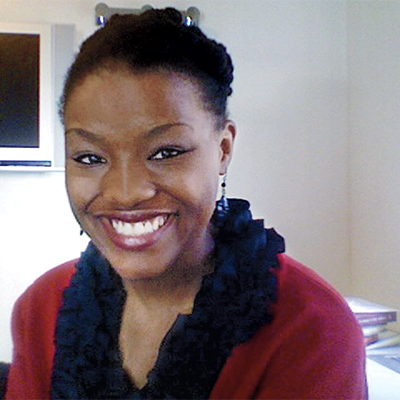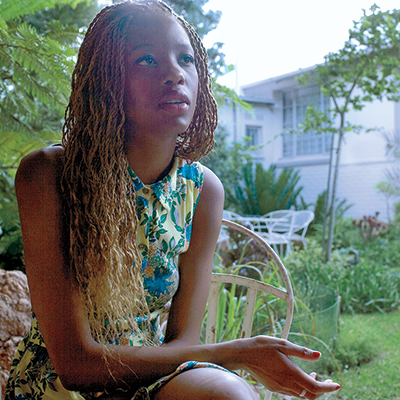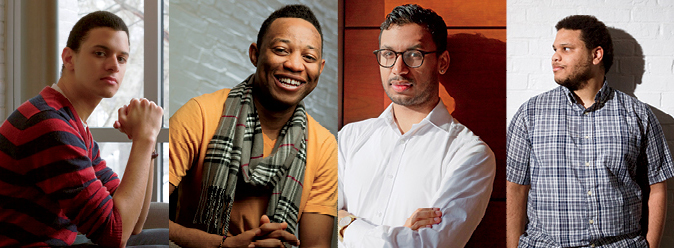By Emily Gold Boutilier
In a sense, the South African leader is on campus every day.
[Scholarships] When Nelson Mandela received an honorary doctorate from Amherst in 2005, he issued a challenge: “We in South Africa believe that all can learn—that there are more who are capable of learning, at the very highest levels of education, than are given the chance.” He urged schools to open their doors more widely to those who can’t afford to pay for college. “Today,” he said, “we ask Amherst College, and all of America’s great colleges and universities, to do more.”

Amherst gave an honorary doctorate to Nelson Mandela in 2005.
Photo by Diane Bondareff
One result of that challenge is the Mandela Scholarship, created in the South African leader’s honor and announced at the honorary degree ceremony in New York on May 12, 2005. The scholarship provides need-based financial aid to students from South Africa, Mozambique and Zimbabwe. (Amherst also awarded an honorary doctorate that day to Mandela’s wife, Mozambican humanitarian Graça Machel.)
The first Mandela Scholar matriculated at Amherst in 2006, and three arrived the following year. In total, 12 have received the scholarship, including five current students. “In this world under threat,” Mandela said that day in New York, “colleges and universities remain our best hope.”
“It Felt Like He Was an Angel”
Sebabatso Manoeli ’11 and Zandile Bekwa ’11 were among the first four Mandela Scholars.
Sebabatso Manoeli
Amherst sent a message to private schools in South Africa informing them of the opportunity for southern Africans to study at Amherst through the scholarship. Schools were encouraged to nominate a student. I am grateful to have been selected. Accepting the offer to enroll at Amherst is one of the most significant decisions I have made in my life, and I believe it has set me on my current trajectory.
I was 6 years old when Mandela came to power and 7 when my family moved from Lesotho to South Africa. In the post-apartheid era, we were able to reside in suburbs that were previously reserved for white people. Living as one of the first few black families in the area had its challenges, but largely the experience afforded my brother and me a level of dignity and access to opportunities that my parents were denied. This is especially true for my father, who by 1995 had experienced discrimination working in South Africa’s gold mines.

Sebabatso Manoeli ’11 is now a Rhodes Scholar whose work focuses on Sudan.
Mandela was everyone’s hero. My generation was encouraged to take pride in being a part of the new South Africa that we were all building in our daily interactions as fellow citizens in multicultural playgrounds and workplaces. I remember watching some of the Truth and Reconciliation Commission episodes on TV with my family on Sundays, which was a staple for many families across the country. I am grateful to be a part of the generation that witnessed the miracle of a peaceful political transition through the simple virtue of forgiveness combined with a good measure of astute political judgment.
I am told that, having been awarded an honorary doctorate by the college, Mandela stated that the best way to honor him would be to give more South Africans the opportunity to enjoy the college’s prestigious education. So many other leaders would not have used a moment of being honored as a means of creating opportunities for others, but he did. It was only after I graduated from Amherst that I realized the significance of being awarded a scholarship named after Madiba. I felt that, in a way, he had passed the baton of the pursuit of social justice and equal access to opportunities to me and the others who have benefited from his legacy.
I am a Rhodes Scholar at the University of Oxford, where I also serve as president of the Oxford University Africa Society. I completed a master’s in African studies, and in the fall I began a Ph.D. in African history. My work focuses on Sudan. I plan to work in international institutions for the benefit of Africa and other marginalized regions.
Mandela’s passing reminded me of the imperative to continue the work that he began—the work of promoting democracy, as well as just and ethical leadership, in South Africa and abroad. Many of us who have witnessed this valiant but imperfect establishment of democracy have become discouraged by (and sometimes complacent about) the stubborn inequalities in the country. His death reminded me that it is incumbent on each successive generation to choose the path of forgiveness and the peaceful yet persistent pursuit of social justice.
Zandile Bekwa
I had applied only to universities in South Africa, owing to concerns about funding and the fact that I knew very little about other countries. Amherst contacted my school to invite promising students to apply to this specific scholarship. My school’s marketing manager thought of me.
Nelson Mandela has an almost godlike status in South Africa. He was one of the few things that we as South Africans could agree on across racial boundaries. He was a moral compass, and I was amazed at his ability to forgive. As I grew older, I knew I needed to help carry on building what Nelson Mandela had sacrificed much of his life to bring about.
I felt a great sense of pride to come to Amherst under the legacy of a man I respected so much. I would always mention that it was a Nelson Mandela Scholarship, not just a scholarship. It felt like he was an angel, lighting a path for me from some lofty pedestal.

Zandile Bekwa ’11 felt proud to receive a scholarship named after Mandela.
Photo by Clive Hassall
I work at Drama for Life, an NGO at the University of the Witwatersrand in Johannesburg. I majored in political science and theater and dance; this job merges my interests in social development and drama.
When we lost Mandela, I felt our country had lost our moral compass. His death exposed the reality of the bleak future we face, the widening inequality. Our leadership is losing sight of the ideals we fought so hard for. In a world where it’s hard to truly admire and aspire to be like someone, Madiba motivates me to aim higher, work harder and believe I can make a difference.
Honored and Proud
The Scholars now on campus feel a responsibility to continue work that Nelson Mandela began.
Jason Adams ’14 chose Amherst for its diversity and because it had honored the former president of his country. He teared up upon learning he was a Mandela Scholar. “Any South African would be honored and proud to attend Amherst.” A double major in economics and Russian, he sees himself as “a type of ambassador for South Africa, like Madiba.” Since the leader’s death, Adams has been “concerned for the well-being of South Africa’s social, political and economic future.” Adams’ mother met Mandela in the early 1990s: “From this, I knew Madiba was a warm person.” Later, Adams learned about and admired Mandela’s smaller-scale accomplishments, such as co-founding South Africa’s first black-owned law firm.

Nelson Mandela Scholars from left: Kerwin Tichmann ’16, Courage Matiza ’15, Dexter Padayachee ’13 and Jason Adams ’14. Photos by Rob Mattson
Perseverance Gijima ’14 knew he wanted to major in chemistry at Amherst. “I also wanted to explore the open curriculum.” He created an interdisciplinary second major, in African studies, and is now writing a thesis on land reforms and land distribution in postcolonial Zimbabwe, his home country. He hopes to work in health care consulting and to someday earn an M.B.A. and M.P.H. His ultimate goal: to start a foundation or nonprofit to improve health care delivery in Zimbabwe. Growing up, he heard conflicting opinions on Mandela, with some saying the leader failed to deliver on promises. But Gijima doesn’t like to focus on shortcomings. For Mandela’s role in freeing South Africa from apartheid, “he deserves to be remembered and revered,” Gijima says.
Dexter Padayachee ’13 was the first in his immediate family to attend college. “The prestige of being a Mandela Scholar amplified the significance of this. Without Mandela’s work and accomplishments, this scholarship would not have existed and I may not have had the opportunity to attend Amherst,” says the black studies major. “I have benefited from his life, and therefore I feel a sense of urgency to do something productive for others.” He now has a job in the dean of students’ office at Amherst, where he works with international students “in an effort to make the four years spent here both comfortable and meaningful.”
Kerwin Tichmann ’16 came to Amherst to explore different ways of living. “The opportunity to go to one of the best colleges in America, and to broaden my experience of cultures, education and people, was too much to let pass,” says the South African psychology major. Being a Mandela Scholar has amplified Tichmann’s pride in and admiration for the leader’s patience, strength of character and attempts to unite a nation. “He was the first example that most teachers, parents and other grown-ups went to when they needed an image of a kind, generous and strong role model,” Tichmann says. “Now I feel (more than ever) like it is my responsibility, as a Mandela Scholar, to continue to express the kind of values he fought for.”
“To be awarded a scholarship in the name of Nelson Mandela was unexpected and a bit shocking,” says Liberty Chigova ’15, a political science major from Zimbabwe. It’s made him feel connected to Mandela’s “impact on the world.”
A double major in biochemistry and history, Courage Matiza ’15 came to Amherst for the open curriculum and the liberal arts education. In his hometown in Zimbabwe, Mandela was a household hero and Matiza’s role model. “I respected his bravery and patriotism, his undying determination to fight for equality.” Now, as a Mandela Scholar, Matiza feels a direct connection to the leader’s “vision of education equality and youth empowerment.” He says of his childhood hero, “His legacy survives his death.”